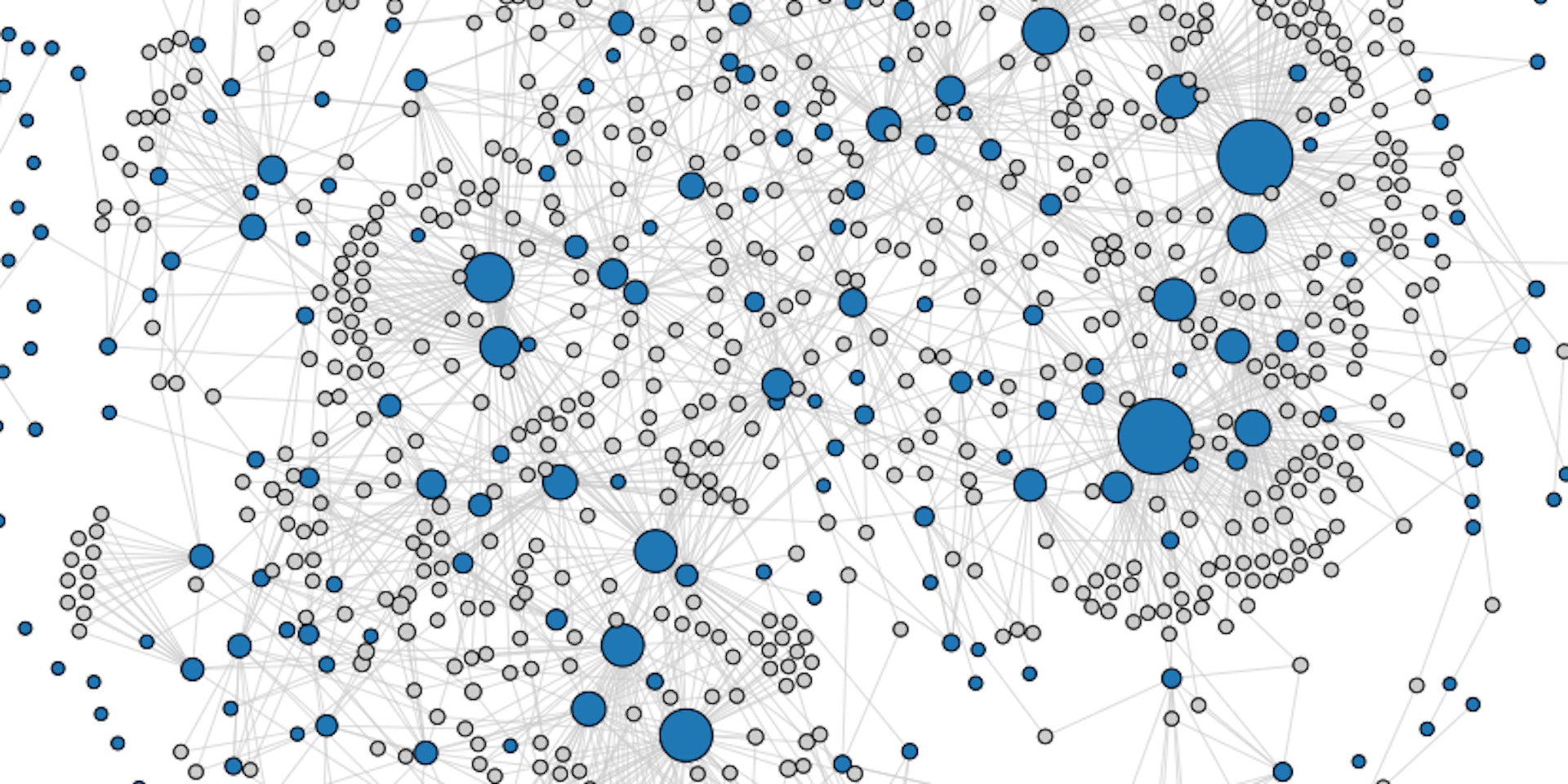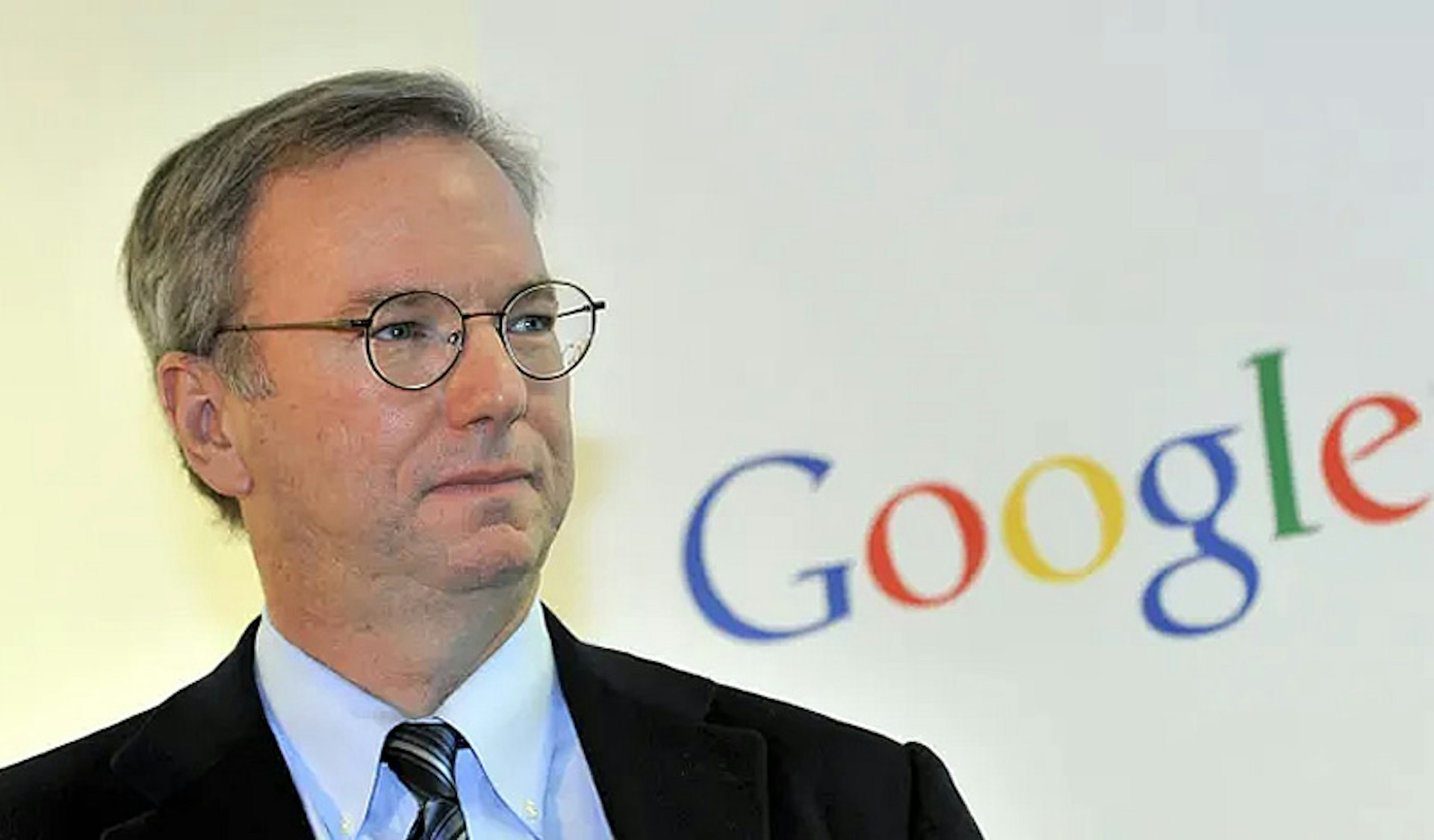Google has been inextricably associated with academia since its inception. The parents of both founders were academics and the company itself was conceived and born at Stanford University. Sergey Brin’s biography on Google’s site still states: “He is currently on leave from the Ph.D. program in computer science at Stanford University.”
The company has cultivated a college-like atmosphere, offering yellow bicycles for employees to ride around its sprawling campus. Its partnerships with Carnegie Mellon University are so extensive that a Google office is housed on the school’s campus.
Behind the scenes, however, Google has exercised an increasingly pernicious influence on academic research, paying millions of dollars each year to academics and scholars who produce papers that support its business and policy goals. An in-depth examination by the Google Transparency Project identified 330 research papers published between 2005 and 2017 on public policy matters of interest to Google that were in some way funded by the company.
In more than half of those cases (54%), academics were directly funded by Google. The remainder worked for, or were affiliated with, groups or institutions that were funded by Google. In the majority of cases, readers of the papers would not have been aware of the corporate funding: Academics did not disclose the Google funding in nearly two-thirds of cases (65%). Authors failed to disclose funding even when they were directly funded by Google in more than a quarter (26%) of cases.
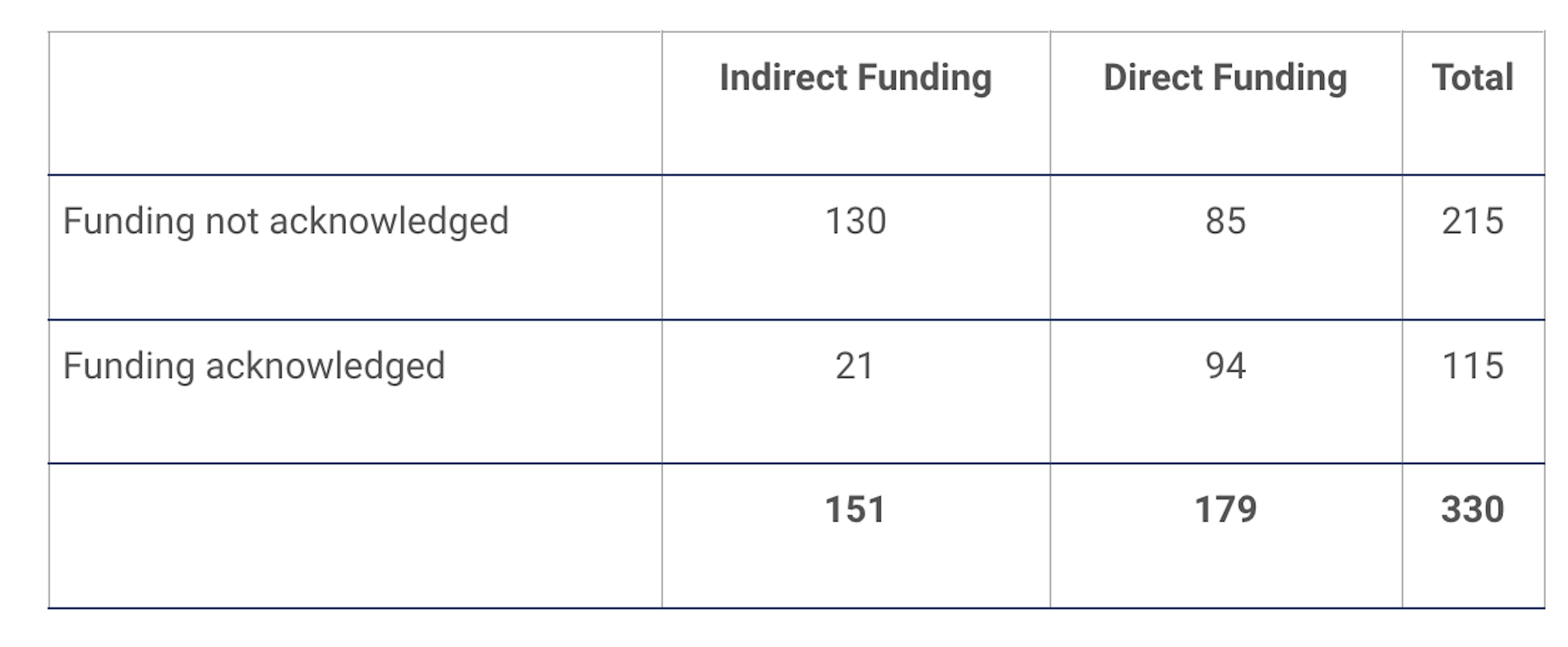
Figure 1: The full database of studies is available here. Source: GTP Research
The academic papers examined encompassed a wide range of policy and legal issues of critical importance to Google’s bottom line, including antitrust, privacy, net neutrality, search neutrality, patents and copyright. They were also tied to specific issues that Google sought to influence.
The number of Google-funded studies tended to spike during moments when its business model came under threat from regulators—or when the company had opportunities to push for regulations on its competitors.
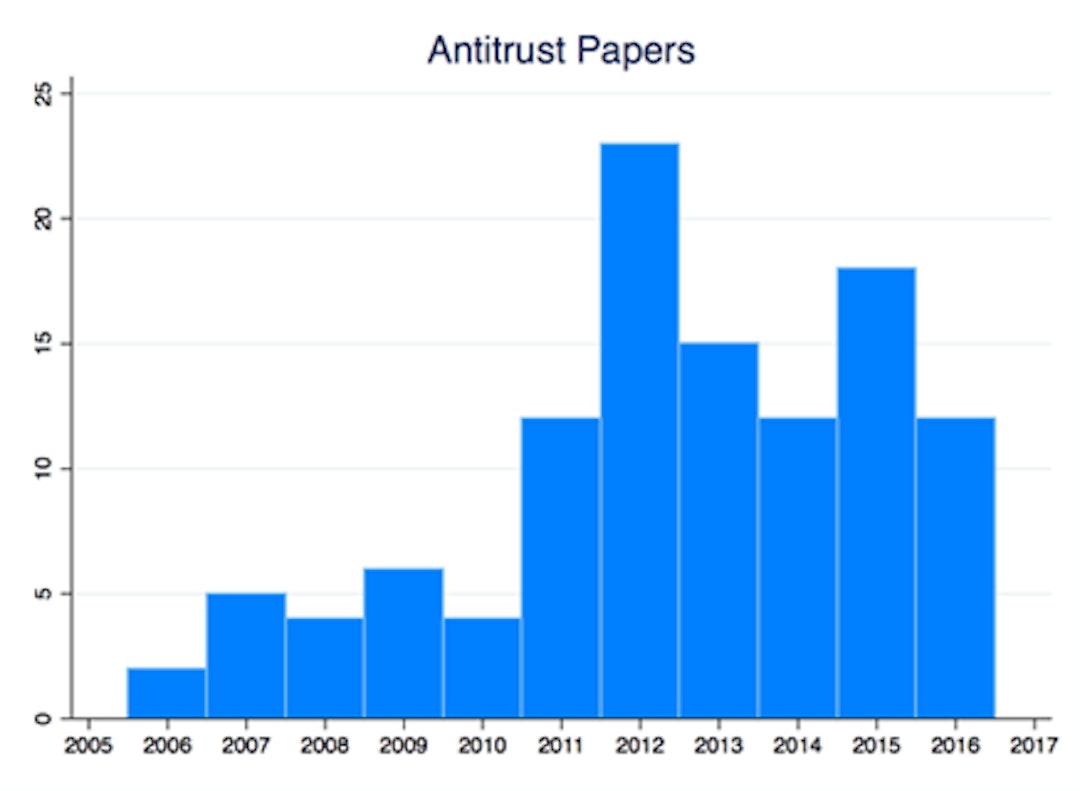
Figure 2: Google-funded competition studies spiked in 2012, during the FTC antitrust probe
For example: Google began to fund a barrage of academic studies on antitrust issues in 2011, a time when U.S. antitrust enforcers began to scrutinize the company’s practices. Overall, more than a third (113) of the Google-funded studies in our dataset focused on antitrust issues—the largest single category.
The largest number of studies were published in 2012, coinciding with major antitrust investigations into its conduct by the Federal Trade Commission and European regulators. (See Fig. 2)
Between 2011 and 2013, Google funded academics authored at least 50 studies on antitrust issues. Among others, studies included Google and the Limits of Antitrust: The Case Against the Case Against Google, authored by Geoffrey Manne with the International Center for Law & Economics (ICLE) and Joshua Wright from George Mason University and Search, Essential Facilities, and the Antitrust Duty to Deal by Marina Lao at Seton Hall University.
The spike in competition-themed papers subsided after the Federal Trade Commission closed its investigation in early 2013. There was a second spike in 2015, when a potential settlement in Europe fell apart and the European Commission filed formal antitrust charges against the company.

Google-funded Professor Joshua Wright from George Mason University, co-author of Google and the Limits of Antitrust: The Case Against the Case Against Google.
Google-funded studies on copyright issues also surged in 2012, as the company fought anti-piracy bills in Congress. They peaked the following year amid continuing battles over whether it could be held responsible for distributing pirated books, music or movies.
The Google-funded studies came from a wide variety of sources, and often blurred the line between academic research and paid advocacy by the company’s consultants. They were authored by academics, think-tanks, law firms, and economic consultants from some of the leading law schools and universities in the country, including Stanford, Harvard, MIT, University of California Berkeley, UCLA, Rutgers, Georgetown, Northwestern Law School, and Columbia.
They weren’t confined to the U.S. Internationally, Google-funded studies were written by academics at some of the most prestigious universities in Europe, including Oxford (U.K.), Edinburgh University (U.K.), Berlin School of Economics (Germany), Heinrich Heine University (Germany), and KU Leuven (Belgium).
Our inquiry included Google-funded scholarship regardless of whether it advanced Google’s policy agenda or not. While some individual papers offered criticisms of Google, the overwhelming majority tended to support the company’s policy or legal positions.
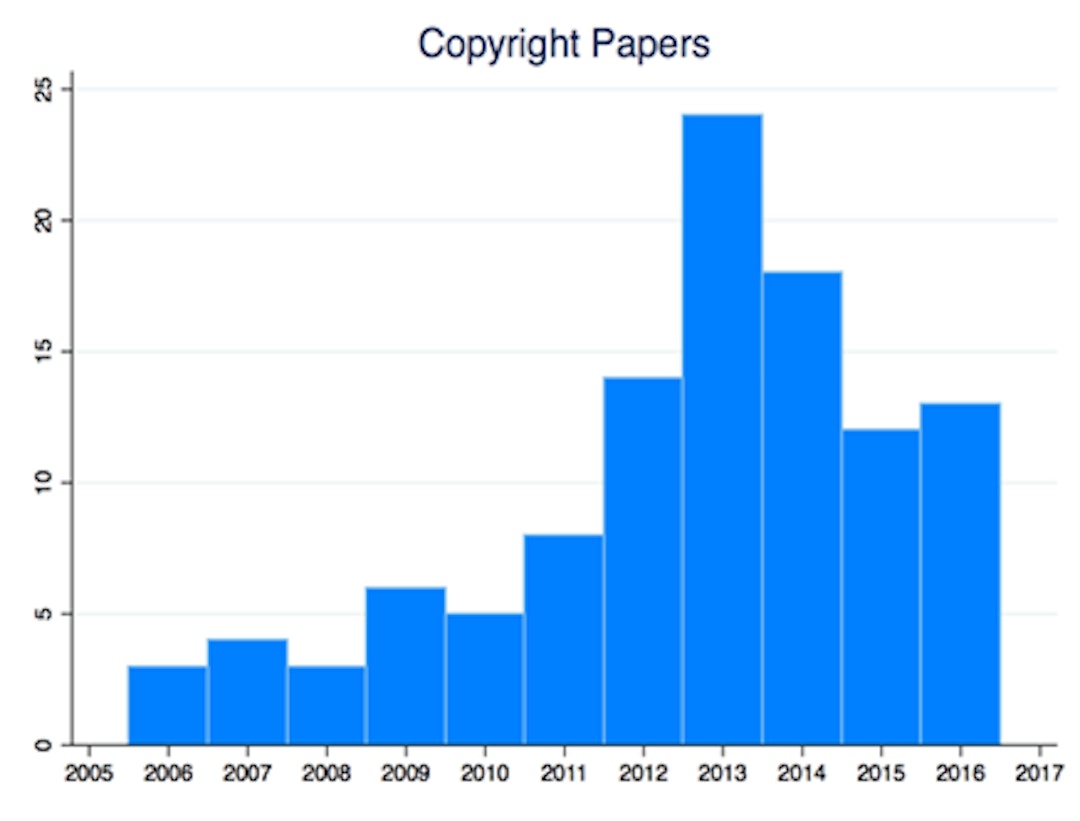
Figure 3: Google-funded copyright papers surged as the company battled anti-piracy bills
Some studies were authored by serious academics and appeared to employ reasonable methodologies, but many others lacked basic standards of academic rigor. Many of the Google-funded policy research papers examined were not published in peer-reviewed journals. Some were self-published on the Social Science Research Network, and many more appeared in publications that lack peer-review requirements. At the extreme, some were little more than thinly veiled opinion articles dressed-up as academic papers, outlining the beliefs of an author on Google’s payroll with little or no supporting evidence.
Google’s paid policy research had broad reach and may have influenced policymakers unaware of its sponsorship. Google lobbyists and lawyers pushed the Google-funded research to journalists, the White House, Congress, journalists, regulators and agencies investigating its conduct, such as the Federal Trade Commission, often without disclosing that they paid for its production. (See: Google-funded Research Used for Lobbying.)
For example, Eric Schmidt, then Google’s chief executive, cited a Google-funded author in written answers to Congress to back his contention that his company wasn’t a monopoly. He didn’t mention Google had paid for the paper.

Stanford’s Mark Lemley has extensive financial ties to Google. “I am not an unbiased observer.”
More recently, Google-funded academics and speakers have dominated FTC conferences (also see: "PrivacyCon Update: More Disclosure of Google Funding") related to online consumer privacy and data security issues without disclosing the company’s funding to regulators or attendees. The company has also sent the research to journalists, policymakers, and other regulators and law-enforcement officials investigating its conduct.
The reach of Google extends further still. Our analysis showed that Google-funded studies routinely cited each other. The practice helps obscure the original Google funding and creates the impression of a large and growing body of academic research that supports the company’s policy positions.
This last point is ironic: It was Larry Page’s middle-of-the-night insight that hyperlinks could be used like academic citations to determine the usefulness of information that famously gave rise to Google. Now Google is creating a universe of paid-for citations with which to advance its policy interests.

Daniel Sokol joked he’d be sipping Mai Tais in Hawaii if he were being sponsored by a company. He later disclosed he consulted for Google.
The 330 Google-funded articles that we identified were cited nearly 6,000 times in more than 4,700 unique articles. Overall, our analysis suggests that Google is using its sponsorship of academic research, not to advance knowledge and understanding, but as an extension of its public relations and influence machine.
Google is not the first company to fund academic research to advance its policy goals. But our analysis suggests that Google is among the companies that have most enthusiastically embraced the practice in recent history—particularly noteworthy for a company that ostensibly places such a high value on real research.
In so doing, Google has joined a list of business sectors that have exercised a corrupting influence on academic research, including the tobacco industry over the effects of smoking and the fossil fuel industry over the science of climate change.
Explore the full database of papers by Google-funded academics
Google Academics Inc. Update
Read the methodology below
Methodology
Our database of Google-sponsored research began with anecdotal inquiries into conference proceedings of policy issues of interest to Google and curricula vitae of authors with known ties to the company. We supplemented this research with three structured searches of Google Scholar, described in detail below. While this methodology resulted in a significant number of policy papers that could be traced through their authors to Google funding, this dataset is by no means comprehensive. Please let us know if you notice any errors or omissions.
For the first structured search, we built a database of recipients of direct Google research support using the company’s own disclosure pages. We then searched for award recipients’ names on Google scholar in conjunction with keywords for relevant policy issues: antitrust, search neutrality, net neutrality, search bias, copyright infringement, patent lawsuit, intellectual property, data security, fair use', 'anticompetitive, public policy, regulation, regulatory, tax, taxation, taxes. We then restricted the results for each author to papers published after the year in which she received her first Google award. Finally, an analyst sorted through these papers manually to determine a) Correct author identification, b) Relevance to policy issues of interest to Google, and c) Whether the author acknowledged Google support in the paper.
The second structured search targeted papers that explicitly acknowledged Google support. We searched Google Scholar for the concurrence of the policy keywords identified above with acknowledgement language: “grant from Google,” “support from Google,” “funding from Google,” “fellowship from Google,” “Google grant,” “Google fellowship,” “Google funding,” “Google research grant,” “Google * fellowship,” “grateful to Google,” “thanks to Google,” “thank Google," "thanks Google.” An analyst sorted through these papers manually to verify a) Whether the responsive phrase was in fact an acknowledgement of Google support, and b) Relevance to policy issues of interest to Google.
In the final structured search, we compiled a list of all of the authors of papers identified in the second structured search and in anecdotal research, and searched Google Scholar for their names alongside the policy keywords used in the previous two searches. We sought papers by authors who may have acknowledged Google support in one publication but not in other papers addressing the same topic. An analyst manually reviewed the results of this search to verify a) Whether the paper was published after the date of first known Google support, b) Relevance to policy issues of interest to Google, and c) Whether the author acknowledged Google support in the paper.
To construct the citation network, we iterated through our completed database of Google-funded papers on Google Scholar and clicked the “cited by…” link on each article. We gathered data on each article that cited a Google-funded paper. An analyst manually cleaned this data and omitted results in alphabets other than the Latin alphabet, because those citations could not be verified. The resulting network contained nearly 6,000 connections and is too big to display in an interactive visualization. The interactive network graph that accompanies this article shows the 329 Google-funded papers that we identified and all unfunded papers that cite more than one piece of Google-funded scholarship.
